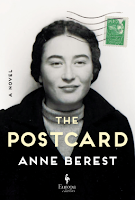My Rating: ⭐⭐⭐⭐⭐
In January 2003, an unsigned postcard is delivered to the Berest home with a picture of the Opera Garnier in Paris addressed to the author’s late grandmother. Handwritten, on the back of the postcard were four names – Ephraïm, Emma, Jacques, and Noémie – the names of four members of the Rabinovitch family, all of whom lost their lives during the Holocaust at Auschwitz. Ephraïm and Emma were the parents of Anne’s grandmother Myriam who was the only member of the Rabinovitch family who survived the Holocaust. However, that traumatic era in family history was seldom discussed at the Berest home and though Anne and her mother were Jewish, faith did not play a significant role in Anne’s upbringing. In fact, after the postcard arrives, it is filed away without much thought given to it. This novel is inspired by the author’s investigation of her family’s history.
Fifteen years later, after an uncomfortable Passover gathering at a friend's home and an unfortunate incident with her six-year-old daughter at school, Anne begins to ponder over her family history and more importantly her identity as a Jew. She recalls the postcard with the names of her ancestors and decides to use that as a starting point for research realizing that by understanding her painful family history and the struggles her mother and grandmother endured will she be able to begin to understand her legacy and how it has impacted her life. What follows is an in-depth exploration of the history of the Rabinovich family spanning four generations from 1918-19 to the present day. Anne’s research begins with whatever information she can glean from her mother, existing documentation and her mother’s own research into Myriam’s family. Anne’s journey is one of looking backward in an effort to move forward.
“I found myself confronted with a latent contradiction. On one side, there was the utopia my parents described as a model society to be built, instilling in us, day after day, the idea that religion was an evil to be fought against. And on the other side, hidden away in some dark crevice of our family life, was the existence of a hidden identity, a mysterious heritage, a strange lineage that drew its raison d’être from the very heart of religion. We were all one big family, no matter the color of our skin or our country of origin; we were all connected to one another through our humanity. But, in the midst of this enlightened discourse, there was that word that kept returning, circling back like a dark star, like some bizarre constellation, surrounded by a halo of mystery. Jew.”
Meticulously researched, informative and insightful, thought-provoking and profoundly moving, The Postcard by Anne Berest (translated by Tina Kover from the original French) is the story of a family, the story of war-torn Europe, the Holocaust and the story of survival and generational trauma. The author also explores anti-Semitism both in the context of the Holocaust as well as in contemporary times. The narrative moves between past and present with the past timeline tracing the family history beginning in the pre-WWII years and how Ephraim and Emma moved their family from Russia to Latvia, with a few years in Palestine, and finally, France from where they were deported to Auschwitz, where they perished in 1942. The author vividly describes the oppression of Jews in Nazi-occupied France and the atrocities exacted upon the Jewish population per the dictates of the Nazi regime. Myriam’s story in the later years of the war gives us a glimpse into the Resistance movement in France and the post-war years after the liberation of the concentration camps. Much of what we learn of Myriam's later life is from memories shared by Lelia. The present-day timeline follows Anne and Lelia as they leave no stone unturned in trying to track down the identity of the person who sent the postcard. The author skillfully weaves the different timelines and characters into a gripping and well-paced narrative. Part –memoir, part historical fiction, this is an important book that I would not hesitate to recommend. A must-read for those who enjoy historical fiction with an element of mystery and appreciate stories inspired by true events.
Many thanks to Europa Editions and NetGalley for the digital review copy of this extraordinary novel. All opinions expressed in this review are my own.
“I see obstacles where others do not. I struggle endlessly to make a connection between the thought of my family and the mythologized occurrence that is genocide. And that struggle is what constitutes me. It is the thing that defines me. For almost forty years, I have tried to draw a shape that resembles me, but without success. Today, though, I can connect those disparate dots. I can see, in the constellation of fragments scattered over the page, a silhouette in which I recognize myself at last: I am the daughter, and the granddaughter, of survivors.”

Comments
Post a Comment